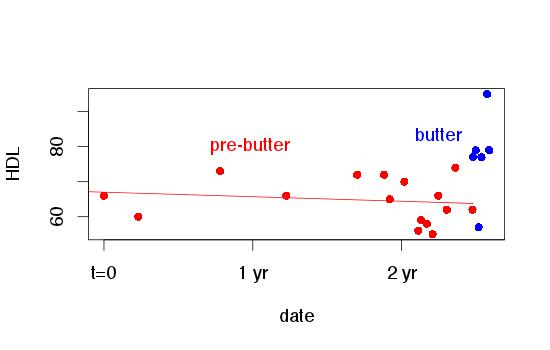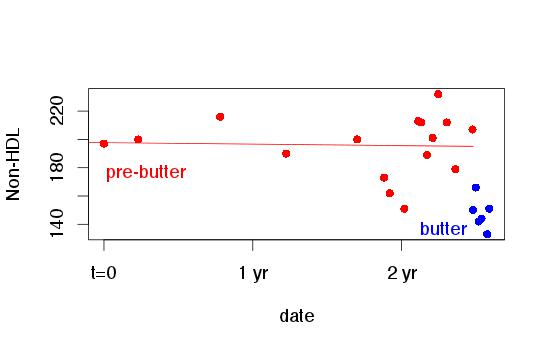It’s hard to get scurvy. If you eat anything resembling an ordinary diet you won’t get it. The existence of scurvy, produced by extreme conditions, led to the discovery of Vitamin C. From the case of scurvy and Vitamin C we learned — well, most people learned — that some diseases are clues to what we need to eat to be healthy.
There is no lab test for irritable bowel syndrome (IBS). It is diagnosed if you have “abdominal pain or discomfort in association with frequent diarrhea or constipation,” says Wikipedia, and a dozen other things (colon cancer, lactose intolerance, celiac disease and so on) can be ruled out. It is common. In the United States, one study found that 14% of those surveyed had it. Surveys in other countries produce even higher values — the United States is not a hotspot. “It is one of the most common diseases diagnosed by doctors,” says an NIH webpage.
What is it telling us? According to the NIH webpage, “medications are an important part of relieving symptoms.” Those medications include anti-depressants. If you treat the problem with drugs, you completely ignore the possibility that a digestive problem is due to eating the wrong food. You might think that would be obvious — but no. Of course, people with IBS are less interested in taking medicine so they often believe they are “intolerant” to various foods. But they have a hard time figuring out what those foods are, and their problems persist. The Wikipedia section about causes is a monument either to the ignorance of medical school professors or Wikipedia contributors:
The cause of IBS is unknown, but several hypotheses have been proposed. The risk of developing IBS increases sixfold after acute gastrointestinal infection. Post-infection, further risk factors are young age, prolonged fever, anxiety, and depression.Publications suggesting the role of brain-gut “axis” appeared in the 1990s, such as the study “Brain-gut response to stress and cholinergic stimulation in IBS” published in the Journal of Clinical Gastroenterology in 1993. A 1997 study published in Gut magazine suggested that IBS was associated with a “derailing of the brain-gut axis.” Psychological factors may be important in the etiology of IBS.
That’s all. Nothing about eating the wrong food. And people wonder what to do about the cost of health care! My suggestion: get rid of everyone (especially medical school professors) too blind or biased to consider that a digestive problem may caused by the wrong food.
Fortunately not everyone is rushing to treat IBS sufferers with drugs. In an obscure journal called Molecular Medical Reports, an open-access article recently appeared about diet and IBS (“Diet and effects of diet management on quality of life and symptoms in patients with irritable bowel syndrome”). The authors are from Norway, which makes the sanity more understandable. The article looks at the effect of dietary advice on IBS symptoms. It compares three groups of patients (IBS patients given dietary advice, IBS patients not given dietary advice, and people without IBS). Patients with IBS eat quite differently than everyone else (for example, they eat less dairy, thinking they might be lactose intolerant), but they are still bad off.
The main point of the article is that the dietary advice was helpful. IBS patients given the advice two years before the study were better off than IBS patients not given the advice, although even those given the advice were considerably worse than normal. Looking at the difference between the diets of the two IBS groups, the better-off group ate a lot more probiotic dairy:
The guided IBS patients reported a consumption of sour milk products containing probiotics almost twice as often as the unguided IBS patients and one and a half times that of the controls. The products used were supplemented with Lactobacillus rhamnosus GG, Lactobacillus acidophilus La-5 and Bifidobacterium Bb-12. Patients with IBS were found to have fewer Lactobacillus spp. and Bifdobacterium spp. in their intestinal flora than healthy individuals (44). These bacteria have been shown to bind to epithelial cells and inhibit pathogen binding, and to enhance barrier function (46). Furthermore, these bacteria do not produce gas on fermenting carbohydrates, an effect which would be amplified as they also inhibit Clostridia spp. (46). A number of studies have shown an improvement in flatulence and abdominal distension with a reduction in the composite IBS symptom score, following probiotic intake (45,46) [emphasis added]
It is highly unlikely that we need to eat sour milk products containing probiotics to be healthy — such products are new in evolutionary history. But it is entirely possible that we need to eat plenty of microbe-laden (e.g., fermented) food to be healthy, as I have said countless times on this blog. The big improvement in IBS symptoms produced by probiotics supports my belief that we need to eat plenty of fermented foods to be healthy. (The Wikipedia entry about IBS mentions probiotics and yogurt, but not fermented foods.) Maybe IBS, like scurvy, is a clue to something really important.
Thanks to Melissa McEwen.

